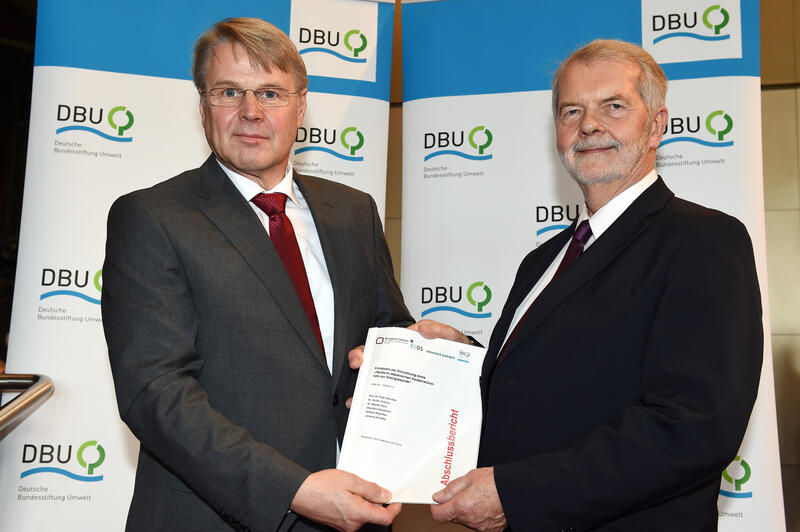German-Japanese Energy Council aims to promote the energy transition
Despite differences in policies on energy and its supply, Japan and Germany are confronted by a similar challenge: to restructure their energy systems in such a way that they are low-risk, reliable, resource-efficient and climate-neutral in the long term. At the same time, both countries must remain internationally competitive on the basis of this ecological modernisation. A planned institutionalised exchange between experts from both countries will aim to facilitate better strategies for meeting this challenge in future. Prof. Peter Hennicke, the former president of the Wuppertal Institute for Climate, Environment and Energy, has initiated a project to form a German-Japanese Energy Council, with the financial and technical backing of the Deutsche Bundesstiftung Umwelt (DBU) and the Stiftung Mercator, and in collaboration with the Wuppertal Institute and ECOS Consult (Osnabrück).
New impetus to energy and climate polices
A preliminary study that partly drew on Hennicke's own experiences in Japan first set out how such an "Energy Council" could give new impetus to energy and climate polices in Japan and Germany, and promote a shift to renewable energy sources across the world. The council will be made up of six energy experts from each country, and be headed by one German and one Japanese co-chair. Three associate members are each to be consulted on special topics. The council will meet up in full session twice a year, alternating between Germany and Japan.
The scientific administration on the German side will be carried out by the Wuppertal Institute, and on the Japanese side by the equally prestigious Institute of Energy Economics, Japan (IEEJ). ECOS Consult will take on the organisational support of the project, drawing on its many years of experience in Japan.
Goal: New and long-term strategies for implementing an ambitious energy transition
The focus of the council's work will be on facilitating the scientific exchange of experiences in energy management, and on mutual learning. The goal of the project, and the council's main task, will be to highlight new and long-term strategies for implementing an ambitious energy transition based on good examples from both countries.
"The fundamental differences in structure and energy policies between Germany and Japan are what make this project particularly interesting. If the energy transition can be implemented in these two hi-tech countries in a manner that is socially compatible and economically sustainable, it will not just lead to a doubling of success, but can also serve as a blueprint for other industrial and emerging countries, at least in some core areas," says Hennicke, who is also a winner of the DBU's German Environmental Award.
Bottermann:"Prominent backers in both countries."
DBU Secretary General Dr. Heinrich Bottermann: "Embarking upon a new era with an energy supply based on renewable sources and that uses energy-efficient technologies is a big technical and social challenge both national and internationally. The thorough spadework that has already been done has clearly shown that there is great interest in such a council and its study agenda both from the Japanese and the German side; there are a number of prominent backers in both countries."
Study agenda provides a transparent documentation of the council's competencies in specialist analysis and consultation
On the basis of numerous discussions with high-ranking representatives from the fields of politics, science and civil society, a comprehensive organisational concept for the council has been drawn up, along with a joint study agenda summarised in the following strategic and mutually interesting fields of cooperation:
- The basis and prospects for an ecological industrial policy, including energy and resource efficiency (scenarios and system analyses)
- Strategic goals and framework conditions of the energy transition, with due regard to socio-cultural aspects
- Structuring of the energy market and sustainable electricity market design
- Reallocation of roles and business segments between existing and new players in the energy system
- Technical system developments and new technologies on the path to the energy transition
The envisaged study agenda will draw on the above-named thematic areas after further definition. The aim of the agenda is to provide a transparent documentation of the council's competencies in specialist analysis and consultation and put them at the disposal of politicians and players from the economic sector and civil society. “Our aim is to present feasible options for the energy transition in both countries on the basis of a solid scientific foundation. The German-Japanese Energy Council will facilitate a process of systemised mutual learning about paths to a low-carbon future in both countries,” says Dr. Lars Grotewold, head of the climate-change department at Stiftung Mercator, which is sponsoring the study agenda as a basis for the Energy Council's work.
First meeting on 28/29 September in Tokyo
The council will begin appointing prominent experts from both countries and carrying out intensive preparatory work as of May 2016, so that its first meeting can take place with success on 28/29 September in Tokyo. The project is also being funded by the Japanese Ministry of Economy, Trade and Industry (METI), the German Foreign Office and by the Japanese-German Center Berlin, and is endorsed by the German ministries of the economy and the environment.

© DBU/Himsel